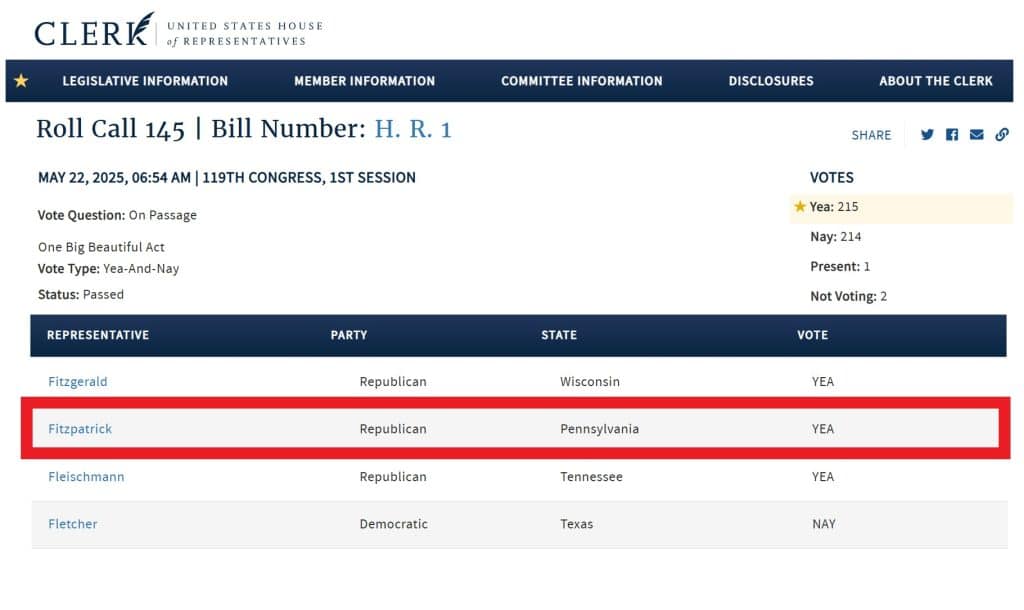A few weeks ago Congressman Brian Fitzpatrick gained national notoriety for being one of two Republican lawmakers to vote against President Trump and the Republican’s deficit-busting, Medicaid gutting, billionaire-benefitting budget when it came up for a vote on its second pass through the House. However, the fact that Fitzpatrick was the deciding vote on this package that slashes food assistance for the poor and health care for the sick on its first trip through the House, when it passed 215-214 and then sent to the Senate, was a fact that was not widely reported.

Votes like this, where Fitzpatrick seemingly balks the will of his party, are what he has built his “independent” reputation upon. But a careful review of our Congressman’s voting record shows that it is all part of a pattern, one that says a lot about the strategy Fitzpatrick deploys to get re-elected. In short, Fitzpatrick only votes against the priorities of his party when his vote is not needed.
Let’s dig in and see the pattern at work.
This second term of the Trump Administration is one where the make-up of the branches of government are constituted in the same manner as they were when Trump and Fitzpatrick took their first oaths of office in 2017. The Presidency is in the hands of a Republican, and the same party controls both the House of Representatives and the Senate. This matters when we reflect upon Fitzpatrick’s strategy, as it is the Speaker of the House, a Republican, who sets the legislative agenda for the Congress, and it is that person who determines what bills come up for a vote.
READ: Congressman Brian Fitzpatrick Votes for the SAVE Act, a ‘Dangerous Step Backward for Our Democracy’
Thinking back to 2017, the biggest priority of the first months of Donald Trump’s first presidency was the repeal of the Affordable Care Act, or Obamacare. House Speaker Paul Ryan attempted to bring up repeal legislation in March of 2017, and was forced to withdraw it when he found there was not enough support in his party to pass a repeal without a replacement. At that time, Fitzpatrick released a statement saying he could not support the bill in its current state. Republicans then scrambled to put together a slapdash package and reintroduced it in May 2017. When that hastily constructed healthcare bill came up for a vote, it passed 217-213. Brian Fitzpatrick was one of 20 Republicans who voted NO … but Paul Ryan didn’t need their votes to get the repeal package passed.
Under Paul Ryan’s speakership during 2017 and 2018, Fitzpatrick repeated this pattern multiple times. Here are a few examples:
- In March 2018, the Republicans in the House brought H.R. 1119 to the floor. This was a bill to slash clean air regulations. The bill had far more votes than were needed to pass the House, so a dozen Republicans, including Brian Fitzpatrick, were permitted to vote against the measure. It passed, 215-189.
- In April 2018, Paul Ryan brought up another bill that would trash environmental regulations, this time H.R. 3144 would cut protections to endangered species to enable hydropower plants to be built. Eight Republicans, including Brian Fitzpatrick, were given leave to vote NO, as there was more than enough support to pass the measure. It passed the House 225-189.
- In June 2018, Paul Ryan brought up H.R. 3 for a vote. This was a bill that clawed back funding previously passed to support a number of programs (something that might sound familiar, as Congress just did the same thing last week to pull funds back from NPR and PBS), including $5.1 billion from Children Health Insurance Fund. Paul Ryan didn’t need Fitzpatrick’s vote, so he and other Republicans were permitted to vote NO, as the measure depriving children of health care passed 210-206.
- Later in June 2018 the Farm Bill came up for a vote as H.R. 2. The Farm Bill contains funding for nutrition assistance programs, and Republicans attempted to pass a work requirement for food stamps, or SNAP. Again, Speaker Ryan had enough votes to pass the bill on its second attempt, and Fitzpatrick and over a dozen of his colleagues were permitted to vote against that Republican priority. But as the bill had enough support to pass, those NO votes were not a problem. The Farm bill passed the House 213-211.
Across that 115th Congress, Brian Fitzpatrick voted with President Trump’s agenda items nearly 85% of the time. But the scenarios above show that even when Fitzpatrick voted against Trump, it was only when his party already had enough votes to pass the legislation, and his support was not needed. He was allowed to place these NO votes to bolster his perception as “an independent voice,” though the close observer will recognize that this was done strategically – he never balked the Republican Party when they needed his support.
READ: Congressman Brian Fitzpatrick’s Phony Telephone Town Halls Are Like Crank Calls to Democracy
The 116th Congress, from 2019-2020, brought about changes in leadership. The Democrats took back control of the House, and House Speaker Nancy Pelosi would set the agenda for legislation. And with a different party in power, we’ll see that a similar strategy was deployed by Fitzpatrick, though it took a slightly different shape, much like a photo-negative of what we saw when Paul Ryan and the Republicans had the Speaker’s gavel. With Democrats in control, Fitzpatrick would sometimes vote with Democrats to pass bills … but only because the Republicans were in control of the Senate, and even if a bill passed the House it would only go to die in the pile of legislation that was ignored by Republican Senate Majority Leader Mitch McConnell. Once again, Fitzpatrick could bolster the impression that he was acting independently, even though none of the bills he supported ever was signed into law.
At the time, we referred to this phenomena as the “McConnell’s Graveyard.” And some of the bills that Fitzpatrick supported, with Republican leadership understanding that nothing would come of it because of McConnell’s graveyard, included:
- H.R. 5: Equality Act – a bill to amend the Civil Rights Act of 1964 to define sex discrimination to include discrimination on the basis of sexual orientation or gender identity, giving the LGBTQ community full protection
- H.R. 7: Paycheck Fairness Act – a bill that would address the problem of pay disparities between men and women by increasing transparency and civil penalties for violations of equal pay provisions
- H.R. 8: Bipartisan Background Checks Act of 2019 – a bill that would close a number of loopholes that exempt many gun purchases/sales from undergoing background checks. Of particular note, this bill closes the notorious “gun show loophole” that exempts private gun sales from checks.
- H.R. 9: Climate Action Now Act – a bill that required the President to stay in the Paris Climate Agreement and to develop a plan to meet our nation’s determined contribution to combat climate change, including cutting our greenhouse gas emissions by 26%-28% below 2005 levels by 2025
There were hundreds of bills that rotted in McConnell’s Graveyard. The four above were just a sampling of the measures that Fitzpatrick supported – with the tacit approval of his party’s leadership – knowing that doing so only benefited him by promoting his carefully created image, while never risking the chance that the legislative priorities included within would make it into law.
We can see more evidence of this pattern by comparing Fitzpatrick’s voting behavior during the time when Democrats controlled the House and Republicans controlled the Senate (and the McConnell Graveyard was in effect) with how Fitzpatrick voted when Democrats had control of both the House and the Senate. Sadly, the FiveThirtyEight Trump Tracker website is no longer available online and the Wayback machine does not have great backups from that site. But I kept archives of some of that data, and I show that in November 2020, towards the end of the the 116th Congress (when Democrats controlled the House but McConnell ran the Senate) Fitzpatrick was voting with his fellow Republicans only 62% of the time. Fast forward to 2023, when there was no McConnell Graveyard in effect and Democrats controlled the Senate, and Fitzpatrick’s adherence to his party’s priorities had increased to 78% of the time. When the party could not count on having a block on Democratic bills, Fitzpatrick drastically decreased how often he voted with Democrats.
READ: Rep. Brian Fitzpatrick Helps House Republicans Pass the ‘Gulf of America Act’
That brings us back to the current day, and Fitzpatrick’s flip-flop on the awful Budget that Donald Trump signed into law on July 4th. House Speaker Mike Johnson had a terrible time trying to build support for that budget bill that stripped regular folks of healthcare and food stamps to give a massive tax break to billionaires. He barely got the bill through the House, with it only passing by a single vote. And when Donald Trump and Mike Johnson desperately needed him, Brian Fitzpatrick had their back. He voted for that budget bill, so that it could advance to the Senate. Fitzpatrick’s vote was the only reason that bill did not die in the House. It was only when the bill passed through the Senate with modifications that would harm even more people, and when the Republicans had even more support for the package and his vote was no longer needed for passage that Brian Fitzpatrick was allowed to vote NO.
The pattern is there.
It has been in effect the entire time Brian Fitzpatrick has been in Congress. When the Republicans need his vote to advance their goals, he is a loyal soldier and does the bidding of his party. But when they don’t need his vote, party leaders allow Fitzpatrick to vote in a manner designed to build his reputation and appeal to the voters of PA-01.
READ: How Democrats Can Win By Organizing from the County Up
Do not fall for Fitzpatrick’s cynical strategy. In this time of creeping authoritarianism, masked law enforcement kidnapping people from the streets of our community, and Supreme Court-backed executive overreach, we need a representative who respects the oath of office and the constitutional responsibilities of the position. We do not need a puppet of the administration who talks of independence to deceive his electorate while unfailingly obeying the demands of his party leadership.
We deserve better.






